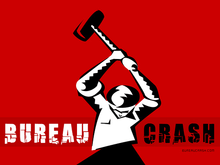Bureaucrash
 Logo of the project | |
| Formation | 2001 |
|---|---|
| Purpose | Libertarian Activism |
| Headquarters | Washington DC |
Region served | International |
Parent organization | Competitive Enterprise Institute |
| Website | Bureaucrash.com |
Bureaucrash was an international network of libertarian activists whose stated goals were "decreasing the scope of government" and "increasing individual freedom", and which engaged in culture jamming.[1][2][3][4]
History
Bureaucrash was founded in 2001 by businessman Al Rosenberg and the Henry Hazlitt Foundation in an attempt to use the Internet to spread what the group calls "pro-freedom" ideals.[5] The following year, the Henry Hazlitt Foundation went out of business and was absorbed into the International Society for Individual Liberty.[6] Bureaucrash survived its parent organization, and in March 2006, an interview with then "Crasher-in-Chief" Jason Talley, on the Competitive Enterprise Institute's website, stated that "In March, Bureaucrash and CEI formed a new strategic partnership to combine the strengths of each organization to help spread the ideas of liberty."[7]
Initially, Bureaucrash pitched itself as "a network of guerrilla activists who oppose the growing disease of the bureaucratic state" and emphasized that "we come from all backgrounds and ideologies, but share in common a conviction that the bloated administrative government is the greatest threat to our freedom, creativity and sense of choice."[8] The following year the group's website was more explicit about its political slant stating that it "develops full scale campaigns and web resources for libertarian guerilla activism."[9]
Following Jason Talley's departure from the position of "Crasher-in-Chief," friend and fellow activist Pete Eyre became the new head of the organization[10][11][12] until his departure in early 2009[13] to take part in a new project,[14] the Motorhome Diaries: Searching for freedom in America. Not coincidentally, Talley later worked with Eyre on the Motorhome Diaries. Eyre had previously worked at the Institute for Humane Studies, the Drug Policy Alliance and as an intern at the Cato Institute.[15]
Activism
Past actions by "crashers" have taken the form of holding counter-demonstrations at key progressive events and filming themselves either with provocative placards or interacting with the attendees. At a March 2001 rally against a speech by David Horowitz at the University of California, Berkeley, 'crashers staged a counter-protest on free speech grounds.[16] Actions have included demonstrating against the 2003 invasion of Iraq,[17] picketing the World Health Organization conference with the message that capitalism saves lives,[18] throwing powdered chalk on The Yes Men after The Yes Men failed in an attempt to infiltrate the Cato Institute,[19] and demonstrating at the movie Sicko to protest against socialized healthcare.[20] Bureaucrash took part in Tea Party protests on July 4[21] and the July 17th protest against health care reform.[22] Bureaucrash is listed as a co-sponsor for the 9/12 DC protest.[23]
Perception
Libertarian historian Brian Doherty described Bureaucrash in Radicals for Capitalism as "a gang of libertarian college kids who prank leftists at major international events by taking the implications of their policies to absurd extremes, which the lefties tend not to even notice. Bureaucrash created a fake group it called 'Progressives Against Progress' whose symbol was a caveman with a club."[24]
Bureaucrash was called a group "where punk rock meets the gold standard" in The Wall Street Journal.[25]
The network's work has been favorably showcased by prominent British libertarian blog Samizdata.[26]
Funding
Bureaucrash was a 501(c)(3) non-profit organization. It was established in 2001 with funding from the now-defunct Henry Hazlitt Foundation. As of March, 2006 the group has been sponsored by the Competitive Enterprise Institute.
References
- ↑ Smith, Raymond A.; Patricia D. Siplon (2006). Drugs into bodies: global AIDS treatment activism. Alan Berkman, M.D. (AFT). Greenwood Publishing Group. p. 144. ISBN 0-275-98325-0.
- ↑ Dinan, William; David Miller (2007). Thinker, Faker, Spinner, Spy (Illustrated ed.). Pluto Press. p. 133. ISBN 0-7453-2444-4.
- ↑ Blomquist, Cord (December 4, 2008). "About". Bureaucrash.com. Retrieved March 16, 2009.
- ↑ Means, Sean P. (July 6, 2007). ""Sicko" spin patrol - continued". The Salt Lake Tribune. Archived from the original on September 14, 2007. Retrieved March 16, 2009.
- ↑ "'Freedom' goes digital". The Washington Times. November 27, 2006. Retrieved March 16, 2009.
- ↑ "Hazlitt Archives".
- ↑ CEI Staff; Jason Talley (March 16, 2006). "Q&A With Jason Talley". Competitive Enterprise Institute. Retrieved March 16, 2009.
- ↑ "Bureaucrash". Bureaucrash.com. Internet Archive. December 4, 2000. Archived from the original on December 4, 2000. Retrieved March 16, 2009.
- ↑ "Bureaucrash: What is Bureaucrash?". Bureaucrash.com. August 4, 2002. Archived from the original on August 4, 2002. Retrieved March 16, 2009.
- ↑ "Pete Eyre | CEI". Archived from the original on October 7, 2008. Retrieved 2008-10-11.
- ↑ "Washington City Paper: Cover Story: The Collapse of the Nationals Market". Retrieved 2008-10-11.
- ↑ "National Journal Magazine - People -". Retrieved 2008-10-11.
- ↑ "Pete Eyre Steps Down". Archived from the original on 2009-06-10.
- ↑ "Motorhome Diaries Crew". Archived from the original on 2009-05-09.
- ↑ http://www.theihs.org/ContentDetails.aspx?id=434
- ↑ Geluardi, John; Judith Scherr (March 16, 2001). "Debate strong over controversial speech". The Berkeley Daily Planet. Retrieved March 16, 2009.
- ↑ 2003 invasion of Iraq
- ↑ "CRASH'D: German Velasquez". YouTube. October 31, 2006. Retrieved March 16, 2009.
- ↑ "CRASH'D: The Yes Men". YouTube. July 11, 2007. Retrieved March 16, 2009.
- ↑ "CRASH'D: Michael Moore's Sicko". YouTube. June 25, 2007. Retrieved March 16, 2009.
- ↑ https://www.youtube.com/watch?v=keNaGfvy_FE
- ↑ https://www.youtube.com/watch?v=i-IY9EtABj8
- ↑ "Archived copy". Archived from the original on 2015-01-19. Retrieved 2012-10-24.
- ↑ Doherty, Brian (2007). Radicals for Capitalism. New York: PublicAffairs. p. 582. ISBN 1-58648-350-1.
- ↑ Frank, Thomas (September 28, 2008). "It's Judgement Day for McCain". The Wall Street Journal. Retrieved March 16, 2009.
- ↑ Alan, Connor (June 13, 2005). "The most talked about economic conference ever?". BBC News. Retrieved March 16, 2009.